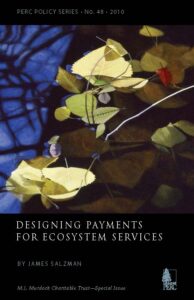M.J. Murdock Charitable Trust—Special Issue
 DOWNLOAD THE FULL REPORT
DOWNLOAD THE FULL REPORT
This Policy Series by James Salzman brings attention to a rapidly developing phenomenon—payments for ecosystem services (PES). Salzman, the Samuel F. Mordecai Professor of Law and the Nicholas Institute Professor of Environmental Policy at Duke University, explains when and where ecosystem services can be provided by voluntary markets rather than government actions.
The key to understanding how PES work is rooted in the basis of any voluntary market transaction—gains from trade. One party agrees to take action because another party offers an incentive. Both parties benefit. A beekeeper, for example, brings her hives to an orchard to provide pollination services for a fee. But Salzman explores the less obvious services such as forests at the top of a municipal watershed that act as a filter providing clean water to people below.
Salzman states that we receive many environmental benefits for “free,” which provides little or no incentive for people to pay for them or for entrepreneurs to provide them. Because price signals that alert individuals about scarce resources in traditional markets are absent, ecosystem services are taken for granted—until they stop providing benefits. Then the cost of remediation or building infrastructure, such as a water treatment plant, makes their value obvious.
For decades the solution to environmental protection has been government action. Today, knowledge about environmental processes combined with increased environmental sensitivity provides opportunities for entrepreneurs to find innovative ways of developing markets for ecosystem services.
This publication is part of the PERC Policy Series of papers on timely environmental topics. This issue was edited by Roger Meiners and Laura Huggins and was designed by Mandy-Scott Bachelier. We are grateful to the M.J. Murdock Charitable Trust for their support of this project.
Download the full report, including endnotes and references.




